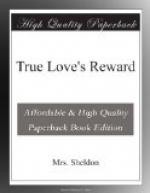Mr. Corbin took the crayon and studied the beautiful face intently for a few moments; then turning his glance again upon his visitor, he said, in a tone of conviction:
“There can be no doubt that you and the original of this picture are closely united by ties of consanguinity, for your resemblance to her is very striking. You spoke in the past tense, however, so I suppose the lady is not living.”
“No, sir; she died at the time of my birth,” Mona answered, sadly.
“Ah! that was very unfortunate for you,” Mr. Corbin remarked, in a tone of sympathy. “You gave your name as Mona Montague, so, of course, Miss Forester must have married a gentleman by that name. May I ask—ah—is he living?”
“No, sir, he is not.”
“Will you kindly give me his whole name?” Mr. Corbin now asked, while his eyes had a gleam of intense interest within their dark depths.
“Richmond Montague.”
Again the lawyer started, and a look of astonishment passed over his features.
“Where have you lived, Miss Montague, since the death of your parents?” he inquired.
“Here in New York, with my uncle.”
“Ah! and who was your uncle, if you please?” and the man seemed to await her reply with almost breathless interest.
“Mr. Dinsmore—Walter Dinsmore.”
The lawyer sat suddenly erect, and drew in a long breath, while his keen eyes seemed to be trying to read the girl’s very soul.
He did not speak for nearly a minute; then he said, with his usual composure:
“So, then, you are the niece of Walter Dinsmore, Esq., who died recently, and whose property was claimed by a—a wife who had lived separate from him for a good many years.”
Mona flushed hotly at this remark. It seemed almost like a stain upon her uncle’s fair name to have his domestic affairs spoken of in this way, and she had been very sore over the revelation that he had had a discarded wife living.
“Yes, sir,” she briefly responded, but with an air of dignity that caused a gleam of amusement to leap to the lawyer’s eyes.
“Well—it is very queer,” he remarked, musingly, while his eyes traveled back and forth between the picture he held in his hands and the face of the beautiful girl before him.
Mona looked a trifle surprised—she could not understand what was “queer” in the fact that she was Walter Dinsmore’s niece.
“I suppose,” resumed Mr. Corbin, after another season of reflection, during which he looked both grave and perplexed, “that you have the proofs of all that you claim? You can prove that you are the daughter of Mona Forester and—Richmond Montague?”
Again Mona blushed, and hot tears of grief and shame rushed to her eyes, as, all at once, it flashed into her mind that her errand there would be a fruitless one, for she was utterly powerless to prove anything, while the peculiar emphasis which Mr. Corbin had almost unconsciously used in speaking of her father made her very uncomfortable. She had hoped to learn more than she had to reveal, and that her strong resemblance to her mother’s picture would be sufficient to prove the relationship between them; but now she began to fear that it would not.




